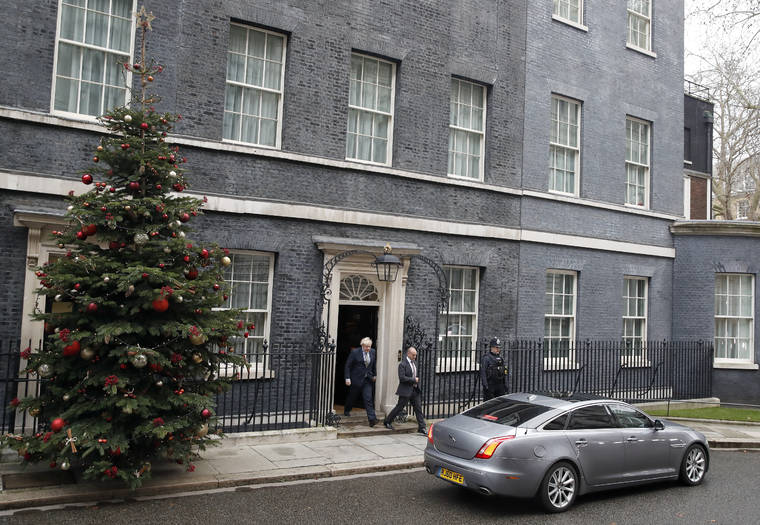LONDON — Prime Minister Boris Johnson has led his Conservative Party to a landslide victory in Britain’s election that was dominated by Brexit. Here are five takeaways from the British election:
BREXIT IS HAPPENING
Johnson’s campaign was built around his pledge to — finally — complete Brexit. With his whopping majority, Johnson now has the political clout to do just that. Expect him to rush through legislation clearing the way for Britain to leave the European Union by the Jan. 31 deadline.
More than three years of wrangling in Britain’s Parliament and in Brussels are set to come to an end with Britain’s departure, although very little will change right away as the Brexit deal with Brussels ushers in a transition period until the end of next year while negotiators attempt to hammer out a comprehensive trade deal between Britain and the bloc. Many analysts believe that time frame is too tight to complete the trade pact.
CONSERVATIVES’ CLEAR MESSAGE
Johnson has a reputation for ill-advised, off-the-cuff comments landing him into hot water.
But throughout the five-week election campaign, he rarely strayed from three simple words: “Get Brexit Done.” The easily digested message was clearly designed to woo voters from both sides of the political spectrum who have grown weary and disillusioned by the squabbling over Britain’s divorce from the European Union.
Johnson refused a face-to-face interview with BBC interviewer Andrew Neil during the campaign and opponents even accused him of ducking into a refrigerated milk storeroom to avoid another interview. That bobbing and weaving to dodge tough questioning drew criticism in the media, but clearly didn’t hurt him with voters.
LABOUR’S WOES
While Johnson stayed on message, embattled opposition Labour Party leader Jeremy Corbyn was widely portrayed as sitting on the fence on Brexit and faced unprecedented criticism during the campaign for his failure to decisively tackle allegations of deep-rooted anti-Semitism in his party. That overshadowed his attempts to highlight his raft of big-ticket socialist reforms.
In a damaging phone conversation leaked to a right-wing website late in the campaign, Labour health spokesman Jonathan Ashworth summed up his party’s problem, saying voters in central and northern England “can’t stand Corbyn and they think Labour’s blocked Brexit.”
And as the dust settled on the historic defeat, former Labour Home Secretary Alan Johnson called Corbyn “a disaster on the doorstep. Everyone knew that he couldn’t lead the working class out of a paper bag.”
Corbyn resisted calls to quit immediately, but said he wouldn’t lead his party into another election.
FRAYING UNION
The Conservatives weren’t the only big winners at the election. The Scottish National Party was also celebrating new-found strength on Friday morning after gaining 13 seats to boost its holding to 48.
Nicola Sturgeon, Scotland’s first minister and leader of the nationalists, said the electoral success gave her a “renewed, refreshed and strengthened mandate” to push for a second vote on Scottish independence.
Five years ago, Scots voted in a referendum to remain in the United Kingdom but at the 2016 Brexit referendum Scotland voted overwhelmingly to remain in the EU. Johnson has ruled out approving a second independence vote in Scotland, setting the stage for a possibly bruising battle on the issue between two leaders emboldened by their strong showing.
Meanwhile, in another sign of fraying of the ties that bind the United Kingdom, the pro-Britain Democratic Unionist Party in Northern Ireland lost two of its 10 seats. The party’s leader, Arlene Foster, blamed Irish nationalist parties for ganging up against the unionists. The only ray of light for Johnson was in Wales, where his party gained six seats while Labour’s share of the vote slumped.
BREXIT PARTY CRASHED
The election may have been all about Brexit, but that didn’t help veteran euroskeptic Nigel Farage and his Brexit Party. It didn’t secure a single seat Thursday, just months after winning Britain’s European Parliament elections in May with nearly 31% of the vote.
Farage helped Johnson into the saddle by deciding not to contest 317 Conservative-held seats to avoid splitting the pro-Brexit vote. That cleared the way for the prime minister to push through his Brexit deal — which Farage believes gives too many concessions to Europe.
“But I would prefer that to a second referendum,” he told the BBC.
———
Follow AP’s full coverage of Brexit and British politics at https://www.apnews.com/Brexit



